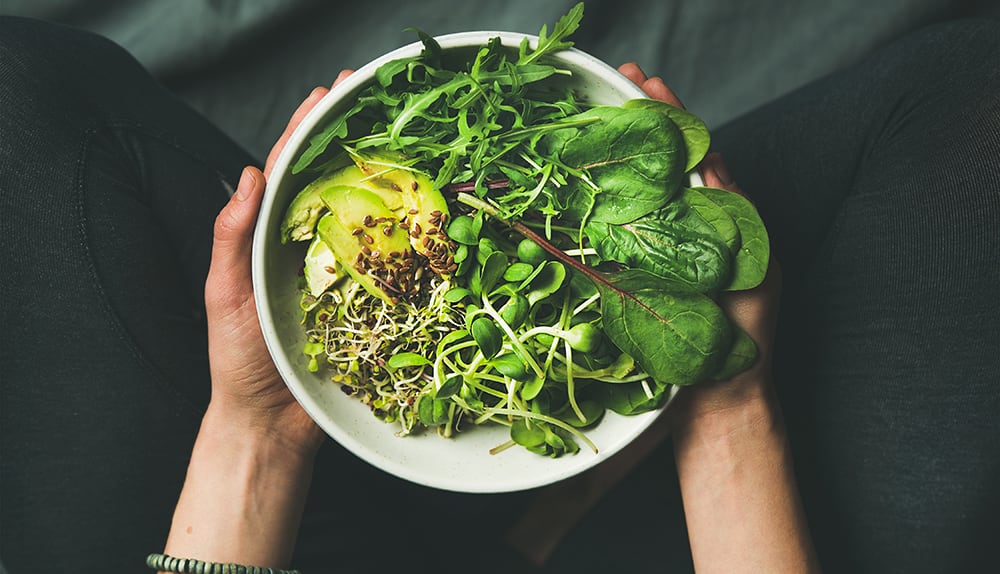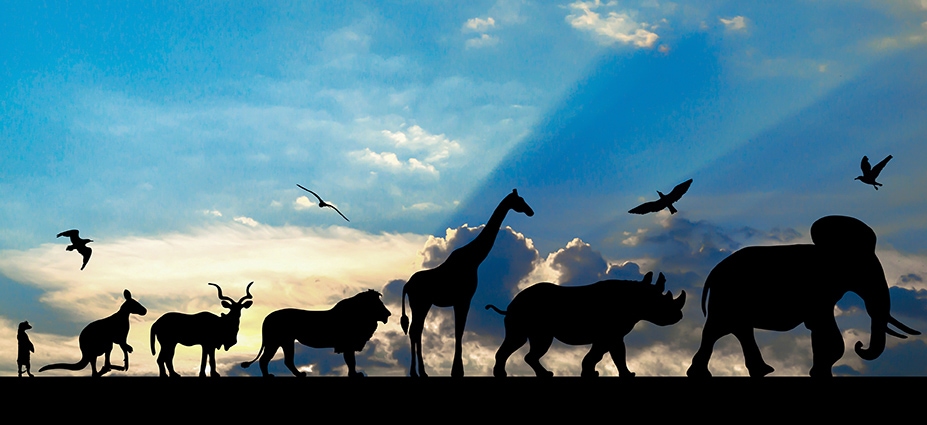When we think about the benefits of a vegetarian diet, we often connect these to the health of our body. Doctors and medical researchers have described these benefits and have recommended vegetarianism to reduce illnesses and contribute to our health and wellness. Along with improving our physical well-being, vegetarianism also has benefits for our mind and soul.
Throughout history, many people have adopted a plant-based diet for more than just their physical health. Due to advances in medical science, the effect of diet on our body has only recently been scientifically proven. Without scientific proof, why did people throughout ages become vegetarians? Are there other reasons besides the health of the body to be vegetarian?
The universe of vegetarians is populated with spiritually enlightened people. Philosophers, thinkers, writers, civic leaders, and humanitarians throughout history have also adopted the vegetarian diet. Many athletes became vegetarian and gained recognition for their outstanding performance. What did they know about the vegetarian diet that may give us food for thought as well?

Observing Nonviolence
Vegetarianism is consistent with leading a life of nonviolence. Many faith traditions teach a common principle—thou shalt not kill. The Golden Rule implores us to do unto others as we would have others do unto us. If we apply this to our lives, it means that we would not want to kill others.
We need only to look at animals—such as a turkey, cow, or chicken being slaughtered for food or a fish caught on a fishing hook writhing in pain—to realize the suffering they undergo in these violent acts. If we applied the golden rule, we would know for sure we would not want that done to us.
There are those who may think animals, birds, and fish are not conscious. However, think of those who own a pet such as a dog or cat. They treat the animal as if it were a human member of the family. The lower forms of life may not have the faculty to know themselves as humans do, but they certainly qualify scientifically under the rubric of living forms—they grow, breathe, eat, and reproduce. They also feel pain. If we are nonviolent, we cannot bear to see any being in pain, whether human or animal, and we want to ensure that we are not the inflictors of that pain.
The great artist Leonardo da Vinci was a vegetarian who had great compassion. Whenever he saw a caged bird, he paid the owner for the cage and the bird. Then, he would open the cage door and watch the joyful bird soar to freedom. Nonviolence recognizes that all animals and all people are children of God. Those who go within through meditation realize that the light of the Creator shining within us is the same light shining within all life forms.
We are What we Eat
Another spiritual reason for being a vegetarian is to avoid lowering our spiritual consciousness with the vibrations of the animals we ingest. When we eat an animal, we are making that animal a part of us. We are ingesting not only the body of the animal but also the vibrations of that animal as well as their hormones.
Think of the fear that an animal would be feeling at the end of its life, caged and mistreated, and then on the way to the slaughterhouse. Think of the tremendous fear and panic the animal experiences as it is being killed. We know that when we experience fear, the hormones of cortisol and adrenaline are released in our body. They affect us by putting the body in stress and breaking down bodily functions. The hormones of cortisol and adrenaline remain in the slaughtered animal, and when we eat that animal they become part of us.
When the Roman poet, Seneca, on learning of the teachings of Pythagoras, became a vegetarian, he found the change a happy one and discovered to his surprise that his “mind had grown more alert and more enlightened.” Albert Einstein, the great physicist, was so convinced of the effect that the vegetarian diet can have on our nature that he believed, if adopted universally, vegetarianism would lead to great improvement in the human condition.
Love for All
Love for all extends to all life forms, including insects, reptiles, fish, birds, and mammals. To love all includes loving all creation. The principle of love for all inspired the founders of different faiths to adopt a vegetarian diet because they recognized that animals are our younger brothers and sisters in God.

To this end, there’s a wonderful anecdote from the life of St. Francis of Assisi. One day, he saw a man carrying two lambs on his shoulders. St. Francis asked him what he was doing with the lambs. When the man replied that he was taking them to the market for sale to the slaughterhouse, St. Francis’s heart was filled with compassion for the animals. It is said that he bartered the coat that he was wearing in exchange for the lambs and put the animals in the care of a friend with the instructions to look after the welfare of the lambs and not to kill them or harm them in any way.
Similarly, we need to be loving and caring to all God’s creatures. We need to open our hearts to embrace all forms of life, even the lower life forms, in love.
Service to the Environment and the Planet
A vegetarian diet supports care and love for animals and a better use of the earth’s resources that are needed for sustaining humanity today and for posterity.

The word ecology involves the root word oikos, meaning “home.” Ecologists regard the whole planet as our home. Just as we do not want to trash our house, pollute our drinking water, suffocate our children with noxious gases, or destroy the resources needed to sustain our house, why would we want to do these things to our universal home, the earth?
In terms of maintaining the earth’s resources through a vegetarian diet, scientists have explained that the grain needed to feed one cow to be slaughtered for food could be used to feed many times that amount of people. In looking at the earth and a growing population, the vegetarian diet offers a more efficient use of our resources. It is a form of giving selfless service to the environment and planet since more people could be fed now and in the future.
Benefits to Meditation
One of the spiritual reasons to be vegetarian is to boost one’s meditation. In meditation, if we wish to experience ourselves as soul, a vegetarian diet speeds our progress. To enter realms of light and love, we need to develop ethical virtues. We need to have the purity of heart by which we can experience the Creator. By following this diet, we develop nonviolence, love, and service to other forms of life.

Spirituality is not only concerned with our own inner development but is a way of living wherein we have love and concern for all life in creation. Spirituality involves bringing us closer to our true nature, our true Self, which is one with God. Just as God is love, the way back to God is also through love. When we are loving to all people and all forms of life, we are on the way back to God. Those who have been successful on the spiritual path know that vegetarianism aids meditation and spiritual progress. Once we realize the divinity that enlivens all forms on our planet, we will spread peace and love wherever we go.
Excerpted and reprinted from “The Vegetarian Diet: Seven Spiritual Reasons for Vegetarianism” by Sant Rajinder Singh Ji (Radiance Publishers 2011).
If you’re interested in learning more about spiritual health and well-being, watch this thought-provoking interview with Renee Mehrra who dialogues with world-renowned spiritual master, Sant Rajinder Singh Ji Maharaj, on the importance of integrating spiritual health into our lives. Your Health Matters with Sant Rajinder Singh Ji Maharaj . Your Health Matters is an innovative health series where experts provide deep insights into critical issues of public health.







